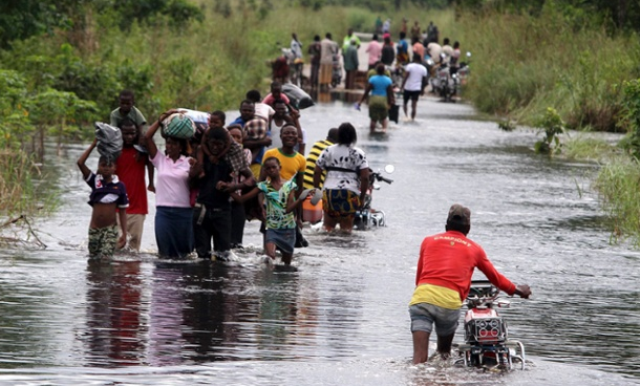By Our Correspondent
Climate change is hitting the Niger Delta badly with heightening flooding that has been displacing a number of inhabitants.
Apart from the inhabitants being dislodged, climate change has also brought untold hardship in the area and by extension across Nigeria, where over 80000 persons have also been sharing in the fate such as the Niger Deltans.
As we already knew, climate change is a change in global or regional climate patterns. This change was noticed in the late 20th century. Those who know better have attributed the causes of climate change to atmospheric carbon dioxide produced by the use of fossil fuels.
However, they said that climate change is caused by two basic factors. These are natural processes (biogeographical) and human activities (anthropogenic).
While the Niger Delta is suffering the atmospheric change as a result of human activities in the area of oil production, the natural processes are the astronomical and the extraterrestrial factors.
These factors are the changes in the eccentricity of the earth’s orbit, the obliquity of the plane of ecliptic and changes in orbital procession.
The extra-terrestrial factors are solar radiation quantity and quality among others. The anthropogenic factor in climate change involves human activities that either emit large amount of greenhouse gases into the atmosphere that depletes the ozone layer or activities that reduce the amount of carbons absorbed from the atmosphere.
The Niger Delta is suffering the effects of climate change much with the emission of large amounts of greenhouse gases here and there that emanate from industrial activities such as burning of fossil fuel, gas flaring, urbanization, etc.
Researchers have inferred that expanding human exercises in the Delta, for example, the utilization of non-renewable energy sources, unsustainable horticulture, deforestation, backwoods fire among others, have included a huge number of amounts of greenhouse gases in the area.
Carbon dioxide, methane, and nitrous oxide, and others are in charge of climate change. Without a doubt, we cannot rule out the characteristic changes that have taken place on earth over an extensive time as one of the factors contributing to the climate change. These progressions are influencing our atmosphere in ways that are disastrous.
One of such progressions is gas flaring which has become a recurring decimal in the Niger Delta. The reckless gas flaring negates human rights of the people in the district. Just like in the Niger Delta, expansion in dimensions of these gases is the reason for rising worldwide temperatures.
In the Niger Delta, this has brought about serious natural emergency that has never been recorded in the history of the region. For example, there is increased temperature believed to cause higher recurrence and disgraceful climate occasions. Example of such ruins that would increase in the Niger Delta, are extreme warmth and dry spell, extraordinary precipitation and genuine flooding, exorbitant breeze and tempest.
In 2012, the Niger Delta experienced staggering flooding that was released from Lagdo Dam in Cameroon. This was as a result of delayed and high precipitation power. With many research done on how to curb further occurrence, it is evidence that the Niger Delta is yet to receive the attention it most needed.
The poverty level in the Niger Delta is exacerbated by high cost of living, because the people’s arable lands have been highly polluted. Checks revealed that in the Niger Delta, the cost of living is the highest in Nigeria.
Climate Change and Impacts in the Niger Delta Coastal Erosion and Floods
The Intergovernmental Panel on Climate Change. Between 1960 and 1970, the Niger Delta has seen its coastal area uprooted by coastal erosion.
The rise in sea level has increased intrusion of sea-water into fresh water sources and ecosystems. Mangroves have been pulled down with agriculture, fisheries and general livelihood devastated. It is expected that the Niger Delta could lose over 15000 square kilometers of land by the year 2100 with a one meter rise in sea level. Moreover, it is predicted that Nigeria will lose about $9 billion as a result of the sea level rise while at least 80% of the people of the Niger Delta will be displaced.
It is a story that touches the heart to note that the temperature trend in Nigeria since 1901 shows increasing pattern. The increase was gradual until the late 1960s and this gave way to a sharp rise in air temperatures from the early 1970s, as according to research, which has continued till date.
The mean air temperature in Nigeria between 1901 and 2005 was 26.6oC while the temperature increase for 105 years was 1.1oC. This is obviously higher than the global mean temperature increase of 0.74 OC recorded since 1860 when actual scientific temperature measurement started.
Experts are troubled should this trend continue; they have said that Nigeria may experience between the middle (2.5oC) and high (4.5oC) risk temperature increase by the year 2100. Rainfall trend in Nigeria between 1901 and 2005 shows a general decline (Fig 3).
Within the 105 years, rainfall amount in Nigeria dropped by 81mm. The declining rainfall became worst from the early 1970s, and the pattern has continued till date. This period of drastic rainfall decline corresponds with the period of sharp temperature rise. However, the rains are increasing in recent times.
Conclusively, changes in global climatic condition have been predicted to continue into the distant future. On the other hand, human activities that reduce the amount of carbon sinks are deforestation, alterations in land use, water pollution and agricultural practices. The human factors have been proven to be responsible for the ongoing unequivocal climate change or global warming.
Therefore, the livelihood assets of the poor will continue to be negatively impacted. Food production in vulnerable local communities such as the Niger Delta will continue to dwindle. The obvious effect of this is food insecurity manifesting in malnutrition and hunger. Also, it has been shown that the rural households diversified their livelihood into the non-farm sector. Therefore, food production will continue to decrease and this has affected food prices beyond the reach of poor households in the region.
In the light of the above it will be recommend, there is an urgent need for a review of existing environmental laws to protect the rights of the poor rural farmers. Government should support local communities through provision of credit facilities and capacity building of community members to improve their adaptive capacity to climate change and other degradation in environmental quality in the region.
The various problems plaguing farming in the area should be addressed by relevant authorities to avoid the danger of impending food insecurity in the region. Policies to build synergies between the farm and non-farm sector in the region should be developed so that both households engaged in the farm and non-farm sector could benefit from each other.
Copyright GbaramatuVoice.
All rights reserved. This material, and other digital content on this website, may not be reproduced, published, broadcast, rewritten or redistributed in whole or in part without prior express written permission from the Niger Delta leading and most trusted newspaper, the GbaramatuVoice.
Contact: info@gbaramatuvoicenews.com or Whatsapp +2348154148945
Support Quality Journalism in the Niger Delta Region
Join us in our mission to bring development journalism, cultural preservation, and environmental awareness to the forefront. Your contribution makes a difference in the lives of the people of the Niger Delta. Donate today and be a part of the change!









